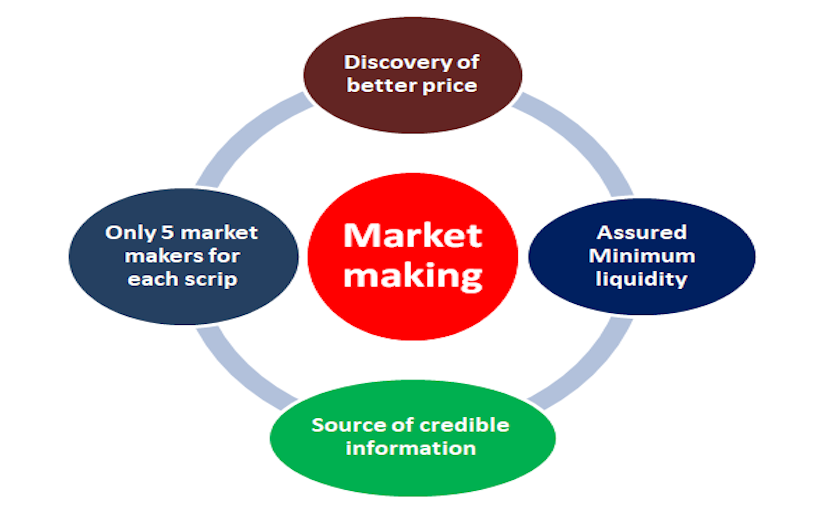Role of market maker in the securities market:
In case of the securities that are not traded frequently, investors in the market do not show any interest in engaging with these shares because of the fear of illiquidity. In such situations, market makers would function in their usual way by placing their bid-ask quote (Rs 1050 – Rs 1000) which essentially means that they are ready to sell the security quoted at a price of Rs 1000 and to buy the security at Rs 1050. Thus they make profit out of the spread that exists between the two quoted prices. This spread is called as bid ask spread. Though concept of market making aims at boosting the liquidity of less-liquid securities, being a mechanism of artificial demand supply creation it always draws criticism.
Risk that is undertaken by market makers:
The primary risk that a market maker undertakes is the possibility of decline in the value of the securities they purchased. However, the bid-ask spread on the huge volume of transactions market makers engage in would ensure that profits are made.
Responsibilities of market maker:
Market Makers are responsible to provide a 2-way quote for 75% of the time in a day. These quotes are monitored by the stock exchange. And the Market Maker should inform the exchange in advance for each and every black out period (remaining 25% of the time in a day) during which the quotes are not offered by the Market Maker.Once registered, a Market Maker has to start offering quotes from the day of the listing / the day when designated as the Market Maker for the respective scrip and shall be subject to the guidelines laid down for market making by the exchangeOnce if some is registered as a Market Maker, he should act in such capacity for a period as mutually decided between the Merchant Banker and the market maker.
Merits of market making:
1. Discovery of better price:
The maximum number of market makers that are designated for a security is 5. This ensures that the Market Makers compete with each other for offering better quotes to the investor. Thus the investors can sell/buy at the most efficient price available.
2. Source of credible information:
Market makers will also engage in monitoring the securities trading and report anomalies to the Exchange for appropriate intervention. This would facilitate more credible information to the investors.
3. Assured Minimum liquidity:
Market makers would assure the in-frequently traded securities of minimum guaranteed liquidity as they should always be ready to buy/sell the same. Recommended Articles
What are the ways in which an IPO can be initiated ??What is listing, its Importance and Benefits of listingSME IPO – BSE’s SME Exchange and NSE’s EmergeAre you an SME? Know your EligibilityWhat is IPO Grading?What does the Recognised Stock Exchange do ?
